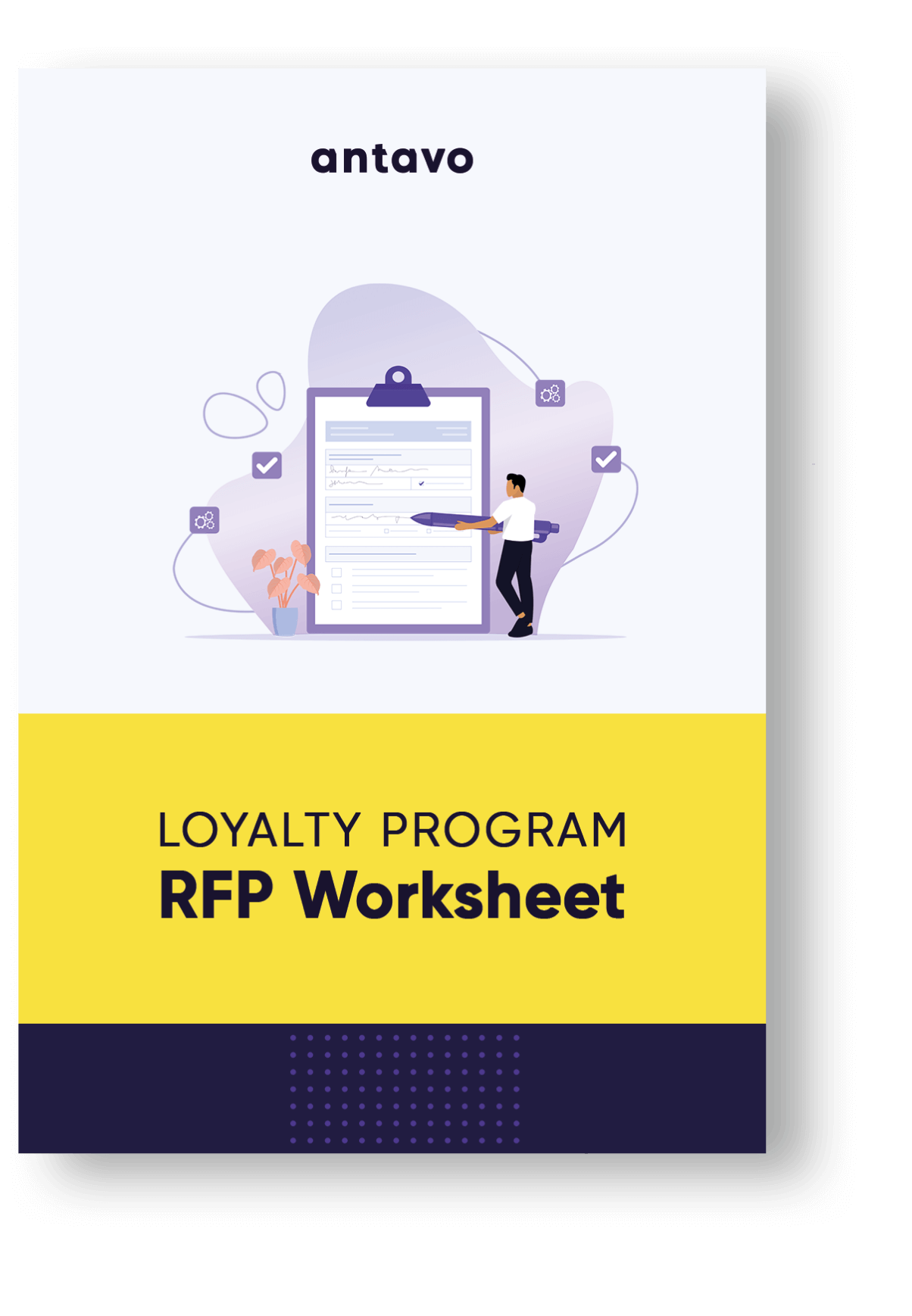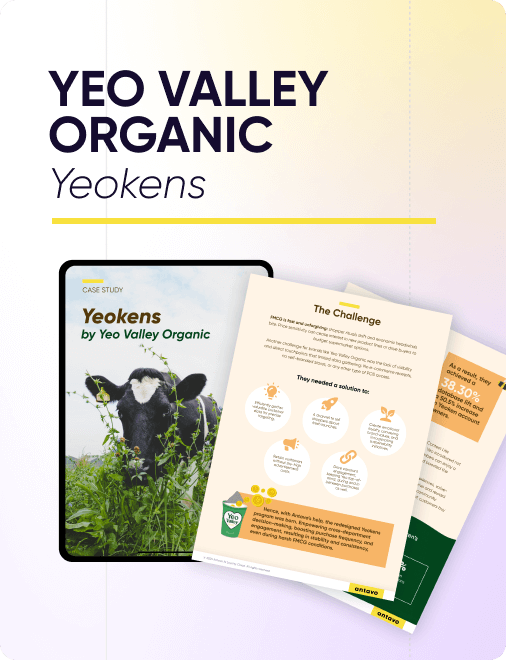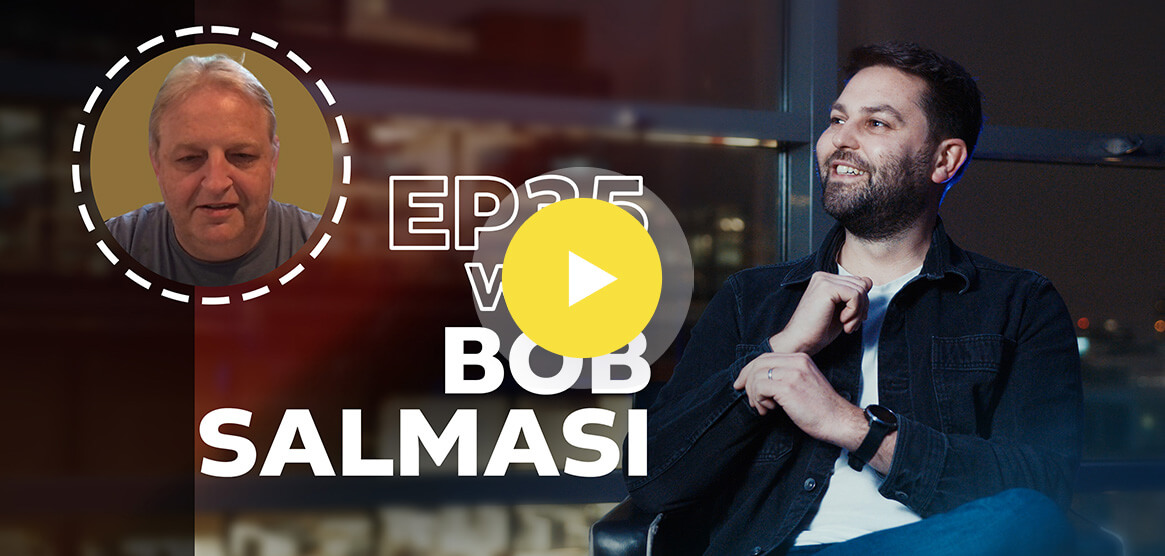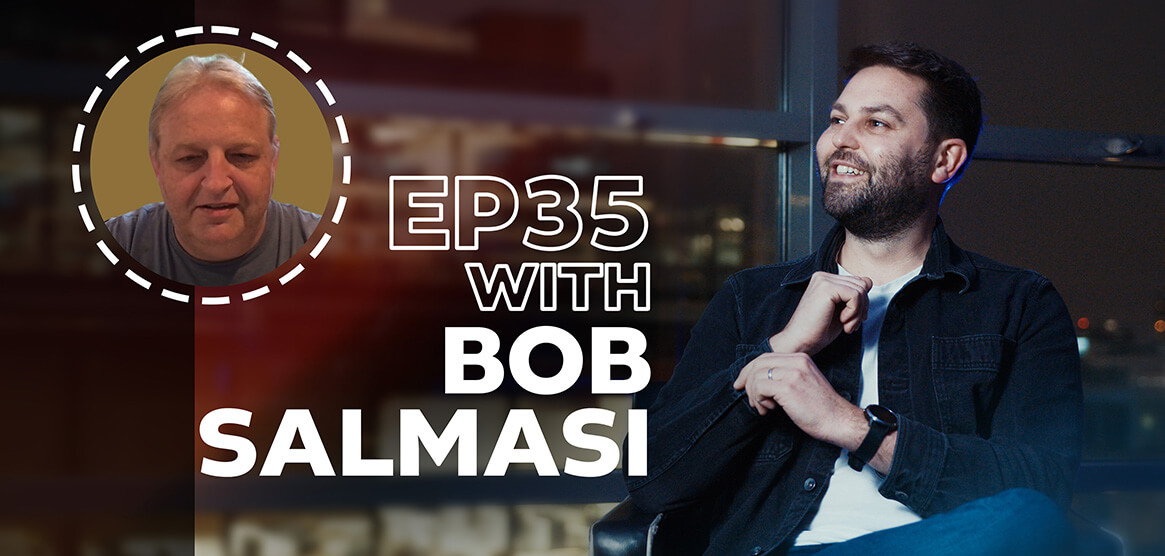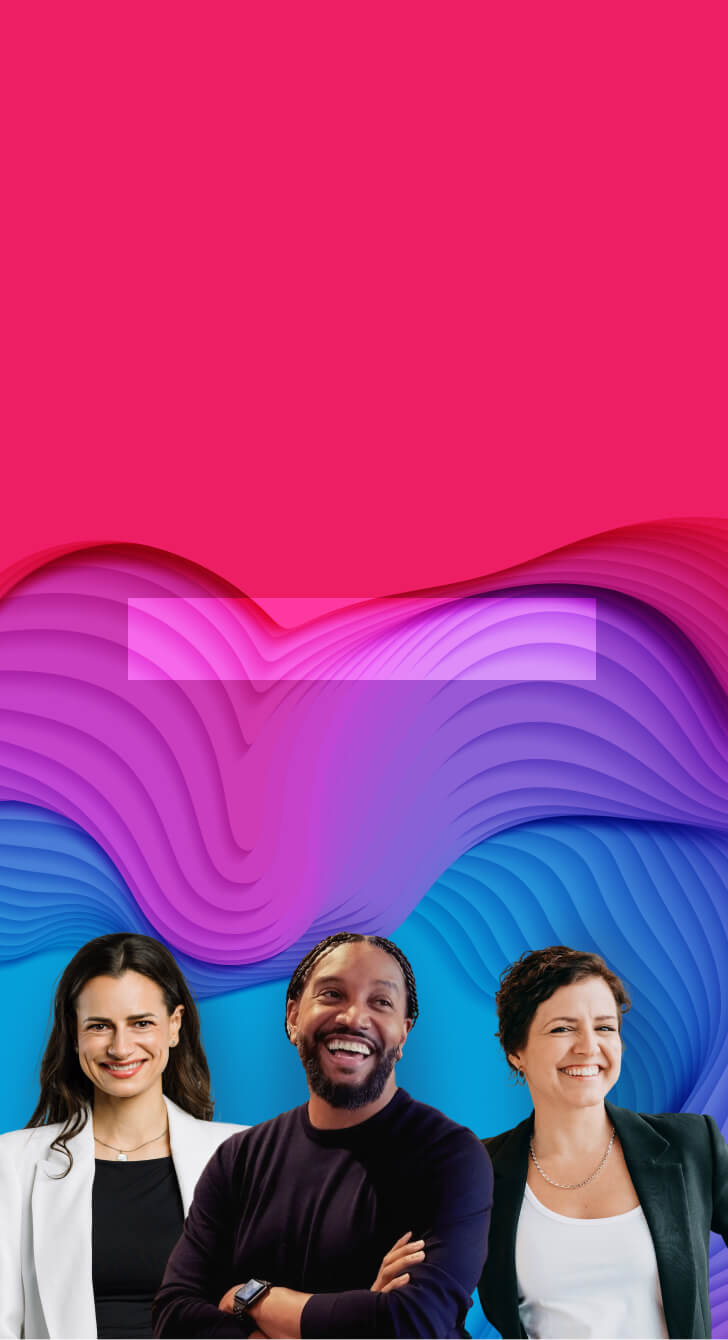On this week’s episode of Antavo’s Loyalty Stories, our guest is Bob Salmasi, Founder of Bob’s Loyalty Shop.
The interview for this podcast has been a valuable source for Antavo’s Global Customer Loyalty Report 2024. Make sure to download it for over 30 statistics on loyalty program trends.
During this episode, we sit down with Bob Salmasi and cover his all-time favorite loyalty program, Meerkat by Compare the Market because of how they transformed a typically dull purchase, like insurance, into a fun, engaging brand experience. Bob also emphasizes the importance of creativity, technology, and content creation in loyalty programs.
Highlights from our conversation with Bob:
- The reason why a customer-centric approach is important
- The important role of data analytics in measuring the effectiveness of programs
- How he was part of a team reintroducing McDonald’s Monopoly program to the UK
- The trends in the industry over the last years
Learn more:
- LinkedIn profile of Bob Salmasi
- Bob’s Loyalty Shop website
- Learn more about increasing loyalty program engagement
- Book a demo with Antavo’s loyalty experts
Charlie
Welcome to Loyalty Stories, Antavo’s podcast on customer loyalty and loyalty programs. I’m Charlie Hawker, Partner Manager for UKI, Benelux and Nordics. Antavo is a technology vendor that powers loyalty programs all over the world. We help various great businesses such as KFC, Benefit Cosmetics, and global automotive fashion companies and other amazing verticals. In this podcast, Loyalty Stories, we dive into the trends around customer loyalty and loyalty programs.
We talk to industry experts around the world to pick their brain to learn what’s next for loyalty. Today’s guest is Bob Salmasi from Bob’s Loyalty Shop. Morning, Bob, how are we doing?
Bob
Good, thanks. How are you?
Charlie
Yeah, very well, very well. Would you mind introducing yourself and your business to the audience, please?
Bob
Yeah, my name is Bob Salmasi and I’ve been working in promotions, direct marketing and loyalty for 30 years now. About four years ago I decided to set up my own business, so I set up Bob’s Loyalty Shop and I work with clients pretty much globally and I have three different types of clients. I work with loyalty agencies, I work with program owners and I also work with incentive companies that are looking to bring the incentive to the market.
Charlie
Nice broad range there. I’m sure we’ll get some great insights today. So we’ll kick off with hopefully an easy one. What’s your favorite loyalty program and why? And it can be one that you’ve worked on. I won’t limit you there.
Bob
Yeah, well it’s one I wish I’d worked on but I didn’t and a lot of people would challenge it in terms of whether it’s a loyalty program or not but in the UK we have an insurance aggregator called Compare the Market and they’ve created a brand called Meerkats and what I love about them is the fact that if you look at insurance you know it’s a great purchase for a start. It’s not something that we think about, it’s not tangible and it’s not exciting from that point of view.
And what they’ve done is they’ve created a character, a set of characters, which are meerkats, and they’ve focused the whole business around that proposition. So in the early days they invested heavily in toys, so if you bought an initial product from them you could collect a range of toys. And then when the world went a bit more digital, you know, they dominated the leisure and lifestyle market. So now, you know, their whole proposition is they’ll give you two-for-one cinema every week. They’ll give you discounted dining seven days a week.
They’ve even launched a coffee product so you can get discounted coffees every day when you go to work or wherever you are. So not only have they made it exciting and involving but from a value proposition. I mean if you spend three or four hundred pounds on any insurance product, if you add up the savings you get back just by enjoying yourself, whether it be dining or cinema or having a coffee with a friend, you more than get that back.
Charlie
Yeah, no, it’s really interesting, really isn’t it? Because when you, as soon as you think more and more about it, there’s that kind of that subliminal loyalty that you’re with them for the funny adverts that your kids enjoy and they get a teddy, but you also get to go out for a coffee or a meal with, you know, wife, whoever. Really interesting.
Bob
But it’s also bravery, because when you think about it, when they first found out a marketing director had to go and present a business case where he wanted to fill up a warehouse full of cuddly toys, which was kind of tested and untested, right? And they had to bet the farm that it would work.
Charlie
Yeah, absolutely. Cause it must have been, yeah, for an insurance company, typically fairly safe marketing strategies around, benefits and just talk about your competitors potentially, and then heavily regulated as well to go, do you know what we’re going to do a meerkat? It does seem when you look at it objectively, it’s kind of bizarre, but how well did it work? Brilliant. Fantastic.
So you said, I mean, that’s one of the ones you would have loved to have worked on, but you have had a distinguished career. What would you say is the work you are most proud of and why? And you can mention the client’s name or you can keep them secret. But I love to hear that from you.
Bob
I guess the two things, well I’m going to put two in and it’ll be cheeky, so the two things I’m proud of is I was part of the team that reintroduced McDonald’s Monopoly into the UK many years ago and I had a 10 year relationship with Monopoly and I’m very proud of that. But the program that I’m most proud of is, it was a loyalty program for Nestle which was called Get So Go Free and it was a cross category promotion and it ran for four years in the run up to the Olympic in 2012.
And it was a points collector scheme. So you could buy packets of cereal or you could buy packets of confectionery or you could buy any kind of Nestle product and you collected points. But the important thing was those points could be redeemed for a completely free activity, sporting activity or leisure activity. So we went and recruited our part in the role, the product part.
So we’ve recruited, every year, 5,000 different independent venues that would give you a free swimming lesson, free swimming session, free golf session. At the top of the chart would be a free whitewater rafting session. So I’m kind of proud of that. We didn’t come up with the proposition, but we did all the magic behind it.
Charlie
That’s, sometimes the grunt work can be very, very rewarding for those sorts of things, isn’t it?
Bob
Well, for me, I always think loyalty is built from the reward up. So the reason I’m proud about it is because, you know, a FMCG is not a well-known industry for points, you know, so back when we first started this journey in 2008, around the four year, um, you know, to, to run a loyalty program for that long in FMCG, and to get the engagement and to make sure that every year we, we went into the detail of looking at what we would, rewards were redeemed and which ones are more popular and swapping them out, and refreshing them and all the sorts of things you would normally do in a loyalty program.
But it was also integrated with the other agencies, right? So, you know, from which pack of cereal we picked up, you might have a specific reward on it because we could track that kind of stuff, you know? So, yeah, so in terms of most proud, I think that for the mirror, the kind of sheer operational achievement and also the longevity.
Charlie
No, it sounds like a fascinating one to work on, especially with that kind of that goal of the Olympics and all of the hype that was around the UK and that 2012 Olympics, that endless summer it felt like as well. It must have been a fantastic culmination for it as well.
Bob
Yeah, no, it was good. So it’s kind of, you know, to sort of start out four years before that with your goal of being recognised for being related to healthy sports and whatever, when you know you’re going to have a home Olympics. It is, you know, strategically, again, we didn’t do the strategy, strategically, it was very good.
Charlie
So if we bring it back to kind of broader and looking back around the loyalty industry as a whole, what are some of the big changes you’ve seen in the loyalty industry in recent years? And you’re in quite a privileged position with this question, because you see across those kinds of three areas that you mentioned earlier. Great to get your thoughts on that.
Bob
Yeah. So loyalty has become a much broader church. Now, if we were having this conversation, even five, 10 years ago, right? Your average person would have said, yeah, I know, I know what loyalty is about, it’s about points and prizes, right? And it’s about more than that. So I think, you know, if you look at just the different people that have entered the loyalty arena just in recent years, like, you know, QSR restaurants, such as McDonald’s and all those people, you know, it’s become more important for them.
Partner collaboration has become more important in the last 5-10 years, but I think that’s also because it’s a way of maintaining a handle on costs. So if you can offer value through partners rather than actual spend on points, that’s always going to be a better option.
And I guess more recently, you know, it’s, everyone’s kind of realizing the importance of first party data. And from a campaign perspective, it doesn’t really matter what loyalty program you’ve got. You know, everyone’s now approaching it from a point of view of how this is not going to mobile phone screen, you know, cause that’s where most people are, sort of consuming that kind of engagement.
Charlie
Yeah, that’s been a massive change. And I think, yeah, when you say it’s broader, there’s lots more, they’re far more accessible because we have these phones in our pockets all the time. And as you said, 10, 15 years ago, the brands that now have loyalty programs, they didn’t even have anyone even looking at loyalty. So it’s, yes, and it’s become a big part of their business as retention kind of moves up that kind of hierarchy.
I think it’s very, very interesting. So, push you a little, you know, get your crystal ball out. Two major fresh trends you think will come to the fore in the next 12, 18, 24 months. What do you think we’re gonna be seeing?
Bob
Well, I think I’m probably at this moment in time probably in the minority, but I think, you know, one of the biggest trends that’s going to come forward in the next 18 months is it’s going to be more about creating and procuring, you know, better content. I think loyalty programs are going to be, well, program owners are going to understand that actually their members are going to be demanding more content from them, and if they don’t step up to the plate, their competitors are dead.
And technology, you know, technology is moving at such a fast pace. So I think the other focus and the other kind of area that I think is going to grow is again, back to that mobile phone screen. It’s going to be, you know, number one, how do we get them to keep our brand on that mobile, whether it be an app or whatever? How do we get them to actually land on that real estate, which is the most valuable real estate ever now?
Number two is going to be, if you look at all the stats about how quickly apps are deleted from the moment they’re kind of, you know, uploaded. It’s keeping it there. So the second part of that is, you know, anything that we do in terms of promotional loyalty, any kind of communication, we’ve got to make sure that we’re delivering it in the best way that consumers want to consume it.
And that’s why you need to stay on top of it. That’s why you need to be, you know, advanced in tech all the time.
Charlie
Yeah, because if you think, if I think about how I’d engage with loyalty programs on a day to day basis, it used to be a few years ago, scrolling through your wallet for where’s my Nando’s card? Where’s my Nectar card? And then and now you’re going through your phone, scrolling through, you can do a quick search by typing it in or whatever it is to find that loyalty program. So it’s definitely evolved for sure.
Bob
Well, just to sort of push the point, if you go back 10 years ago when it was heavily email communication, and you might’ve been in a retailer for say, or insurance company or whoever, right? If loyalty wasn’t a part of the agenda, then the loyalty message was at the bottom of that email. And that email could be a very long email.
It could be, you know, in some instances, prove a point to clients, actually print them off and show it to them, they stick together and take and actually show them and say, that’s where your loyalty message is. So yeah, you know, I think people are really understanding now that it’s not just about having access to people, but understanding how they want to have an engagement.
Charlie
Yeah, no, great. Okay, yeah. And you can definitely see that changing for sure, for sure. And how do you think those trends will evolve? Because you’ve obviously got the mobile first, but that’s kind of, yeah, the last five years have been heavily mobile first because we’ve had lockdowns, etc, etc. Brands have been forced to engage with people at home a lot more. How do you think they’ll evolve beyond that, do you think?
Bob
Well I think you know there’s going to be a greater evaluation of social media. Right so I think the best way I can describe it is the focus for loyalty programs up until recently has been how do we acquire members and I think what will change over the 18 months is it’s not about acquiring members it’s about growing an audience and when you look at channels such as YouTube…
YouTube is the second biggest search engine in the world. I would laugh at this point. I have this conversation with people because in the same way that people used to think, oh, I know what loyalty is about, it’s about points and prizes, right? They go, oh, I know what social media is about, it’s about influencers and TikTok and all this kind of stuff, right? And to a certain extent, it is at the moment, right? And it’s working well for certain brands.
But we’ve only just scratched the surface on this. And actually people are looking for, you know, deeper content, they’re looking for long form content. They’re looking for authenticity, they’re looking to know more about your brand, they’re hungry to know more about your brand. Now, of course it doesn’t work for everyone, certain brands don’t have a lot of story to tell.
But you can decide, okay I’m going to get into this area of lifestyle, I’m going to make it my proposition and I will talk about that. So it doesn’t need to be intricately linked to your brand, you just need to understand that they’re actually…It’s about getting people to really want to work with you and really want to engage with you. And that’s why it’s growing an audience and not growing a membership pay.
Charlie
Yeah. And to build on that, I think there’s definitely, it’s audience first and then it becomes community. If you see that kind of big brands, especially on YouTube, the comment section is unlike some social media where it’s quite negative and there’s lots of trolls in there, it’s actually quite interactive, the YouTube comment section sometimes. So there is that sense of community with the audience.
Bob
Well, even with the trolls, right, I mean, you know, what a great research tool, right? What a great research tool, because I mean, you can sit in as many focus study groups as you want to, right? But there’s nothing that’s going to be more real and authentic, as people are saying to you, oh, I didn’t particularly like what you did here, right? And it might be one or two voices in the wilderness and 50,000 trolls, right? Depending on which brand you are, you know.
Every brand, every personality, every TikTok is going to have trolls, right? That’s just the way it is. So if you discount all those trolls and then look at that data, it’s going to be, you know, fantastically useful to you.
Charlie
Yeah, absolutely, absolutely. That’s very interesting. Yeah, use the data. That’s the big key, isn’t it? Use it to your advantage. Feedback is a gift, as they say. And so when we think about how a loyalty tech provider could support these things, when it comes to a feature set, what are the sorts of things that you’d want to see from a loyalty technology vendor moving forward?
Bob
Well, they are old favorites, right? So, you know, just from, if we look at sort of psychology and consumer behavior, right, we can go to all of our tried and tested means, which are, you know, gamification and all that kind of stuff, right?
But let’s not forget creativity, right? So sales promotion was the sort of birth point of loyalty. And I think it’s gonna be very much part of the loyalty mix going forward. So it’s going to be a mixture of how you can take tried and tested mechanics, tried and tested rewards, right, creativity and advancing tech, and tech is the driver. Right?
Because, you know, there are only four things you can do promotionally with a customer. You can do, you know, a guaranteed reward, you can do competition, you can do etc. Right? And the mechanics, you don’t want to create new mechanics, because they’re intuitive, right. You want to adapt those mechanics in the digital world.
But what’s going to really be in the driving seat is a technology vendor who understands the mechanics and the rewards and focuses completely on how to stay with the audience and go with them and follow the trends.
Charlie
Yeah, very interesting, very interesting. So that adaptability to the future is key in getting that creativity. Back to your earlier points around kind of content being the big trend if you wanna keep that audience, that community with you. It’s gonna have to come down to content in the end. Before we wrap up, is there anything else you’d like to kind of say about any of the future stuff or any kind of thoughts that are kind of burning in your mind at the moment?
Bob
No, I mean, a good place to wrap up is where we started, you know, and it’s like, you know, when you have been doing this for, you know, maybe three decades and you’ve seen a lot of things, it’s exciting that loyalty has become a Boil Church. It’s exciting that, you know, people are understanding that all of these things need to come together and they need to come together from a position of being customer first, mobile first, data first.
So with everyone on the same page and where the endless opportunities advance in technology, there’s never been a more opportunistic or exciting time that I can think of, when technology suppliers, programmers, can get together and really create something wonderful.
Charlie
Yeah, I think that’s fantastic. Well wrapped up and kind of is an exciting world to be in because everything we’re talking about aren’t kind of big problems that we have to face or anything like that. They’re all additive to an end customer experience at the end of the day. So yeah, a positive world to be in, the world of loyalty.
All right, that’s a wrap. Thank you very much, Bob. Really enjoyed that. That was fantastic. I think the best bit was definitely the meerkats. It made me really kind of reevaluate how I was advertised to and being in that marketing boardroom with the CMO going, we’re going to do meerkats.
Bob
Do you know what, when I saw that, I remember turning to my colleagues at the time, and I went, can you imagine the balls of that marketing director that went and said, I think we’re going to sell those many policies, right? So I need to go and buy, I don’t know, five million meerkats, right? And they’re a collectible set. So I need to get them all, you know, and I need to fill up a warehouse, right? And he must have sat there and he must have gone, this doesn’t work, right? I’ve got a warehouse.
Charlie
Yeah, what do I do with neocats?
Bob
Yeah, you can’t even sell them, right? So I’ve got a warehouse full of stuff. And it’s the same with, you know, the other thing is they really have taken Orange Wednesdays and taken it to the next level, right? And what a lot of people don’t appreciate, everyone wants to do that. Everyone wants to say, well, I’d like a program like Orange Wednesdays, right? When you tell them that, you know, allegedly or historically or whatever, right, the marketing spend back in those days was 24 million pounds a year that you have to commit to upfront, right?
Charlie
Wow.
Bob
People go… Okay, no, we’re not doing that, which is why those sort of things excite me because part of it is obviously research based, you know, you don’t go spend that kind of money without doing the research, right, but ultimately, you are taking a major risk, right, and you are you are you are following new ground. So toy collectibles, I’ve just been doing this thing for the IMA, which I’m presenting in a couple weeks time, and it’s about the history of loyalties.
And if you go back to the 60s, there was no end of coin collectors from petrol stations. Right. So you collect 10 coins on the world’s rarest cars, or you collect the English football team, or you collect, you know, whatever thing. So, yeah, so it’s, it’s a different world because we’ve, we’ve for many years, we’ve kind of relied on the fact that there are so many other options, we don’t have to forward invest, which then makes forward investing more scary than simple.
Charlie
Yeah, definitely. I mean, it is, what’s going to be the next new crazy thing that we end up seeing on our TV or collecting? It’s an interesting world for sure.
So wherever you’re listening to us on podcast platforms, YouTube, LinkedIn, please like and subscribe to our channel. That way you’ll get notified about the next episodes. Please visit antavo.com to discover more about your next loyalty software.
Antavo is a next gen loyalty program technology vendor used by global companies like KFC, Benefits Cosmetics and other global brands.
Also, please reach out to Bob at Bob Loyalty Shop for any questions you may have for him. Thanks so much for listening and we’ll catch you next time.
